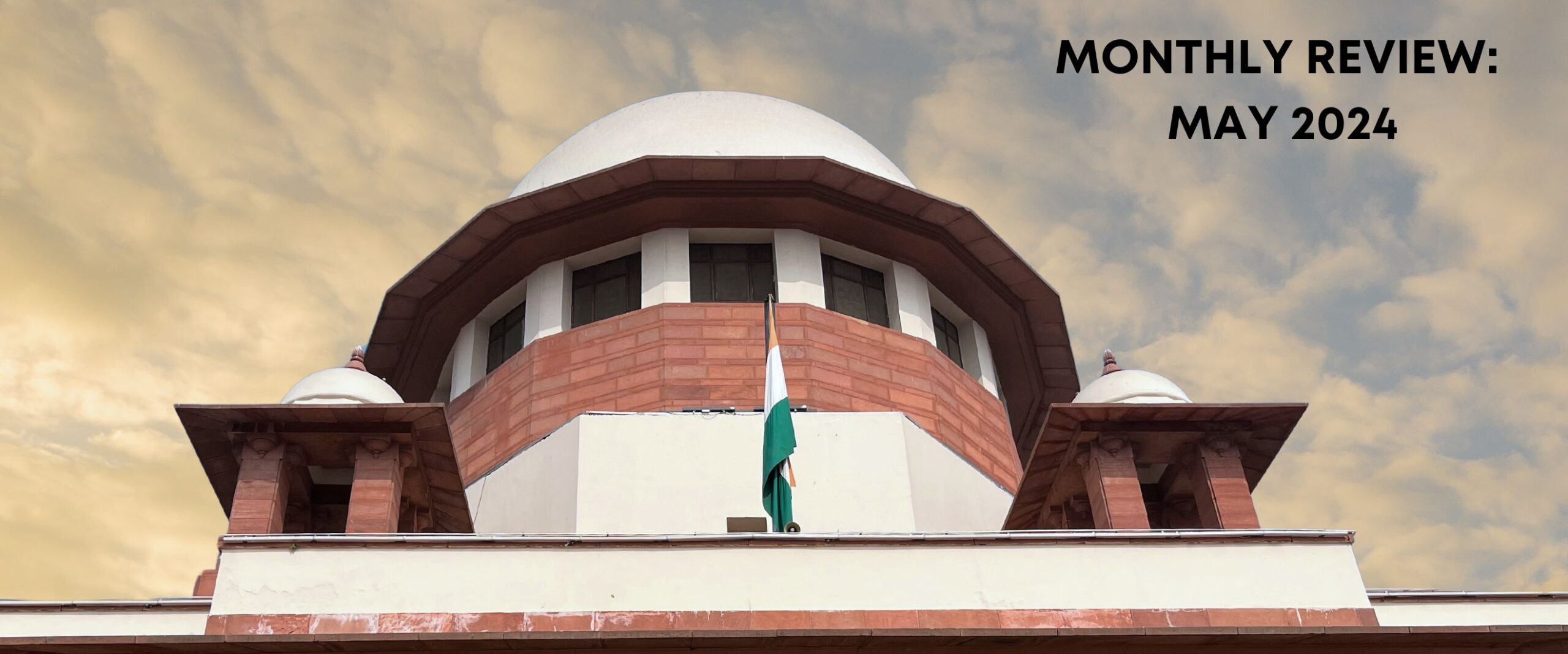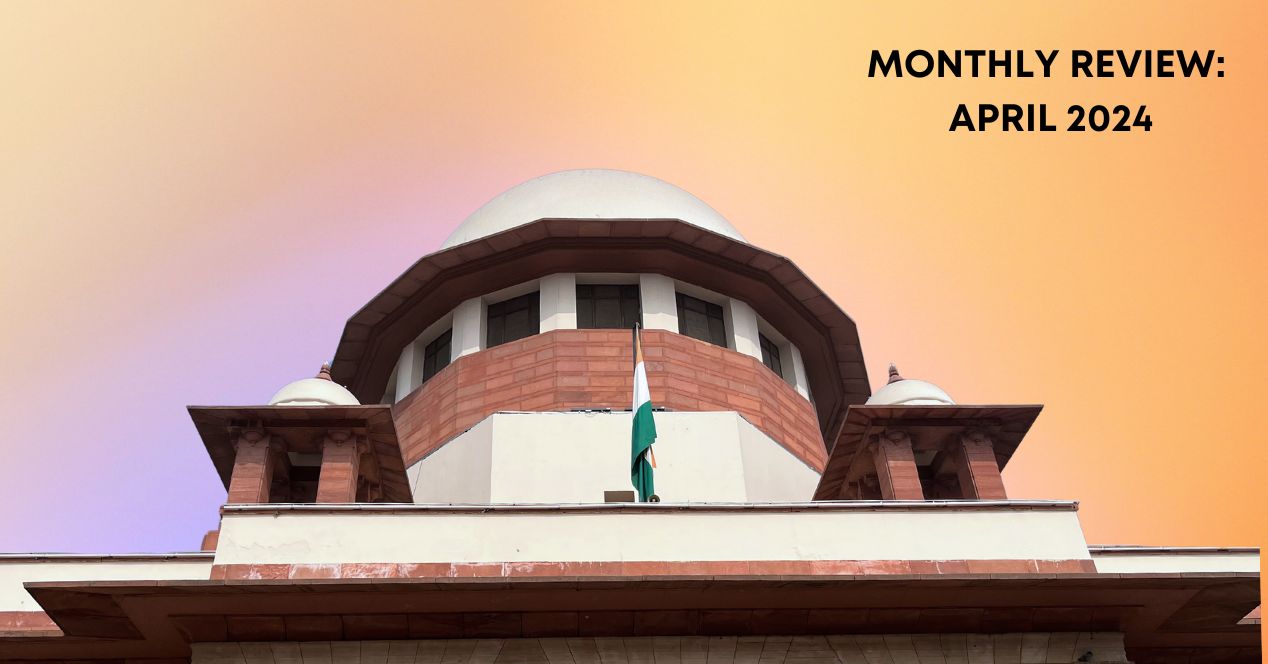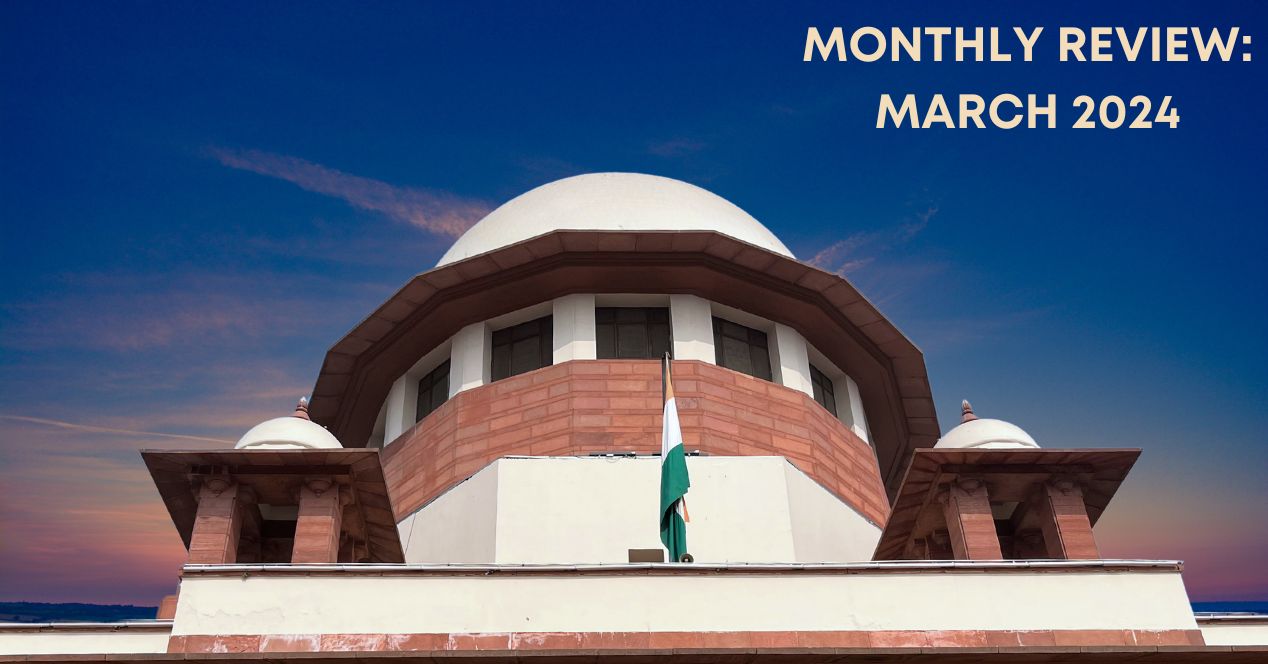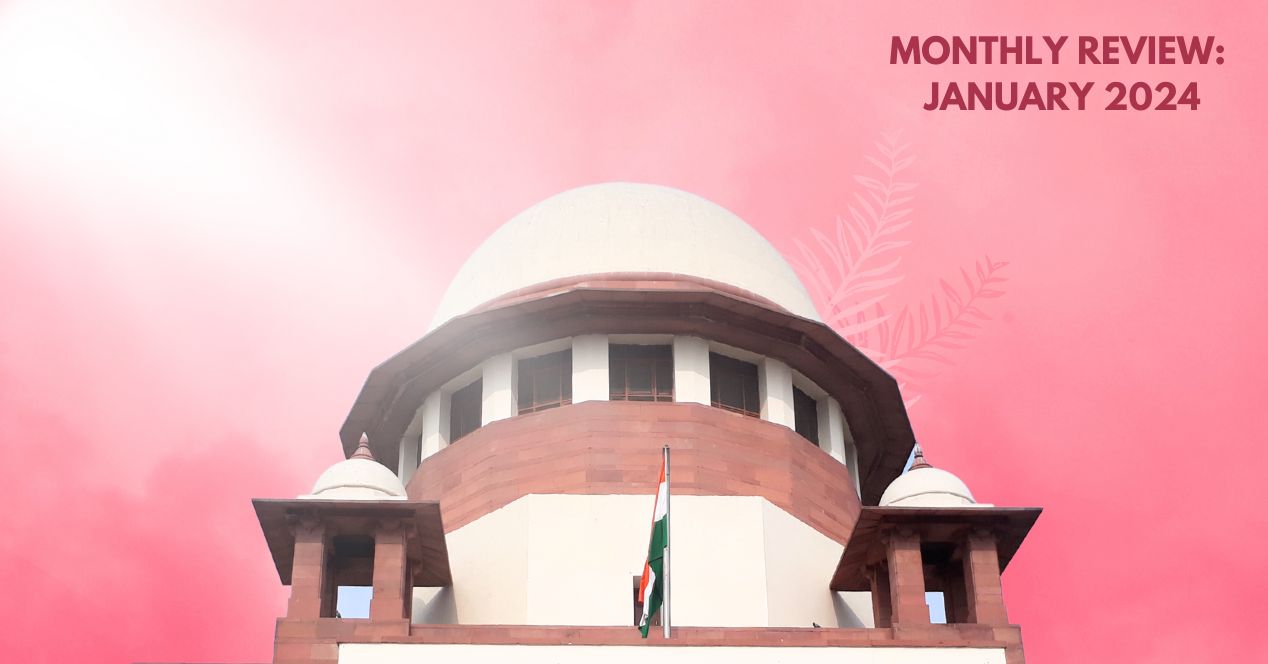Analysis
Monthly Review: May 2024
In May, the top court reserved judgement in one of the oldest nine-judge bench case and granted interim bail to Delhi’s CM Arvind Kejriwal

In May, the Court broke for its annual summer vacation, but before that, it dealt with some high-action political cases. On 10 May, the Court granted interim bail to Arvind Kejriwal. After the Court broke for vacation, the Court also heard former Jharkhand CM Hemant Soren’s plea for bail. At the beginning of the month, the Court also reserved judgement in one of the oldest nine-judge bench cases—Property Owners Association v State of Maharashtra, while Patanjali Ayurved continued to face stern directions from the Court.
In this monthly review, we bring you some action from the Supreme Court Bar elections, along with our regular pieces on retirements and court data. Below is a round up of everything we published in May 2024.
The curious case of Article 31C
On 1 May 2024, a nine-judge Constitution Bench of the Supreme Court reserved judgement on whether private property can be a material resource of the community under Article 39(b) of the Constitution. Article 39(b), a Directive Principle of State Policy, obligates the State to direct its policy towards securing that “that the ownership and control of the material resources of the community are so distributed as best to subserve the common good.”
In SCO’s popular argument matrix format, we break down the key arguments, presented over the five days of the case, into nine discernable issues. Read it here.
At the heart of the case is also a critical question about the constitutional position of Article 31C. This provision was introduced through the 25th Constitutional Amendment to save laws enacted to give effect to Article 39 clauses (b) and (c) from being declared void. Further, the provision also saved these clauses from judicial review. Since then, the provision has been substituted and the substitution struck down.
The question before the Court is if the original provision revives when the substitution is struck down by the Court. The respondents’ relied on the ‘doctrine of revival’, to answer in the affirmative. The petitioners—the property owners unsurprisingly answered in the negative. They stated that the doctrine of revival was a statutory rule of interpretation and could not be applied to constitutional amendments. Neha Vinod explores the nuances of this conundrum in her analysis on the case. Read it here.
A right to campaign
On 10 May 2024, the Supreme Court granted interim bail to Delhi Chief Minister Arvind Kejriwal until 2 June. The interim bail was granted to allow Kejriwal to campaign in the 2024 General Elections, the results of which were declared on 4 June. Following this, Kejriwal reportedly surrendered himself to the Tihar Jail authorities. The Enforcement Directorate (ED) arrested Kejriwal in March for his alleged involvement in the Delhi Liquor policy case.
The Supreme Court imposed specific conditions on Kejriwal: he was directed not to comment on his involvement in the liquor policy case, not to sign any official documents in his capacity as the Chief Minister of Delhi, and not to visit his office or the office of the Delhi Secretariat. The ED objected to his interim bail, claiming that it would send the message that politicians are treated differently.
A day after his bail, we published an article from legal practitioner Soutik Banerjee, who wrote that Kejriwal’s interim bail laid the groundwork for a ‘public interest argument’ in personal liberty cases.
The order was passed by the Division Bench comprising Justices Sanjiv Khanna and Dipankar Datta while hearing Kejriwal’s plea challenging his arrest by the ED. After granting interim bail, the Court continued to hear his arrest plea, eventually reserving judgement on 17 May 2024, a day before the Supreme Court’s summer vacation.
Hemant Soren withdraws petition
Former Chief Minister Hemant Soren lost a battle in the Supreme Court, resulting in his withdrawal of the plea challenging his arrest by the ED. Soren was accused of involvement in an alleged land scam. Over two days of hearings, he argued that the ED did not have sufficient material to assess his guilt, a key criterion for arrest under the Prevention of Money Laundering Act, 2002.
On Day 2 of the hearings, a Vacation Bench of Justices Dipankar Datta and S.C. Sharma came down heavily on Soren for withholding crucial information in his plea challenging the arrest. The Court noted that a cognisance order issued by a Special Court was not mentioned in his plea.
Soren, relying on the bail order granted to Kejriwal, also requested an interim bail for himself. The Bench pointed out that Soren was pursuing parallel bail remedies, as another bail plea was also being considered in a trial court.
The Bench was inclined to dismiss the petition with a note that Soren approached the Court with “unclean hands,” prompting his counsel, Senior Advocate Kapil Sibal to request the withdrawal of the petition.
The Supreme Court’s crackdown on Patanjali gets a new chapter
On 7 May, a division bench of Justices Hima Kohli and Ahsanuddin Amanullah pulled up Patanjali Ayurved for continuing its misleading advertisements pertaining to some of its products on online platforms. 14 of Patanjali’s products have had their licence suspended by the Uttarakhand government for violating the Drugs & Other Magical Remedies Act, 1954.
The long saga between Patanjali and the Supreme Court began in 2022 and captures within it tales of dangerously unscientific ads, a criminal contempt litigation against Patanjali’s managing director Acharya Balkrishna and Baba Ramdev, and many a half baked apologies. As senior journalist V. Venkatesan reports, the case also reveals the “curious case” of one Rule 170 of the Drugs and Cosmetic Rules 1945. Rule 170 prevents advertising of Ayurvedic, Siddha and Unani products without clearance from state licensing authorities. While the Union had earlier endorsed an AYUSH Ministry letter directing states not to take action under Rule 170, now it has submitted to the Court that it no longer supports the letter. The Court’s stern directions, Venkatesan writes, sends a “message to FMCG firms…that they can no longer get away with deceptive information.”
Kapil Sibal’s SCBA election victory
On 16 May, Senior Advocate Kapil Sibal, who is also a Union Minister, secured a comfortable victory for the post of president in the Supreme Court Bar Association elections. He sets himself for his fourth run in his position, having last held the post twenty-three years ago in 2001. Sibal’s entry into the election run was truly last minute, unsettling the scenario in a radical way for his opponents – the former president Adish Aggarwala, Pradeep Kumar Rai, Priya Hingorani, Tripurari Ray and Neeraj Srivastava.
In the run up to election day, V. Venkatesan spoke to voters and candidates to get a mood of what is at stake – a brewing demand to have a regular practising advocate as president instead of senior advocates, anger against a pro-elite ecosystem, and a tussle between Sibal’s ‘rule of law’ vision and a lobby pitched against him because of his support “towards minorities.” “The Bar is no longer the same,” an AOR tells Venkatesan, setting the preface for what lies ahead for the SCBA.
After five years, Justice A.S. Bopanna bids farewell
On 19 May, Justice Ajjikuttira S. Bopanna retired after a 5 year tenure, shorter than the average tenure of sitting Supreme Court judges. Justice Bopanna had been appointed on 24 May 2019, alongside Justices B.R. Gavai, Surya Kant and Aniruddha Bose. Justice Bose retired only a month earlier in April, and had the shortest tenure among the four judges appointed together followed by Justice Bopanna.
Despite the shorter than average tenure, Justice Bopanna had the fifth highest authorship rate when it came to judgements, having penned 91 judgements. This is also the second highest authorship rate among his cohort after Justice Gavai. He authored the highest number of them in his first year, 2019, although he was appointed mid-year. His highest bench-activity in the Supreme Court was in 2021. The biggest portion of his judgements – 22 of 91 – were of criminal matters, followed by service and property law matters.
His most notable judgements include the majority opinion which upheld the Union’s 2016 Demonetisation Scheme, the unanimous decision that struck down the Narasimha Rao judgement, holding that MPs and MLAs are not protected through legislative immunity in bribery cases, and the majority verdict in the Kaushal Kishore case which held that restrictions on freedom of speech under Article 19(2) are exhaustive.
Short tenures for the top judge of India
The current Chief Justice of India, CJI D.Y. Chandrachud will serve a two year tenure at the helm of the Court. This is the longest tenure a CJI has enjoyed since 2012, when Justice S.H. Kapadia was the Chief. The previous Chief, CJI U.U. Lalit had a 73 day tenure.
Average tenures of the post of Chief Justice of India are dropping, going by the tentative list of next eight CJIs. What does this mean for institutional stability? SCO’s Court Data post explains.
Kerala’s money-lending battles with the Union reveals unanswered questions on the Constitution
In April 2023, a division bench of Justices Surya Kant and K.V. Viswanathan referred to a five judge Constitution Bench a matter relating to the Union’s power to control state borrowing, at the root of which is the interpretation of Article 293 of the Constitution. Article 293(3) says that without the Union government’s ‘consent’, a state may not ‘…raise any loan if there is still outstanding any part of a loan which has been made to the State by the Government of India…’
The case is based on a petition filed by the State of Kerala, already indebted to the Union. It was grappling with a financial crisis and the only way to get out – borrowing – was undermined by the Union through Article 293. Kerala’s petition relied on constitutional debates to argue that Article 293 only restricted the state’s borrowing ability from the Union – the state could still borrow from capital markets.
On 3 May, we published a deep dive on the case from Vineeth Krishna, from the Centre of Law and Policy Research. He argues that Kerala only partially quoted a report submitted to the Constituent Assembly to make its case in the Supreme Court, while letting out a sentence which stated that the State’s “freedom to borrow” from open markets only exists if they are not already indebted to the Union. According to Krishna, by using constitutional history, Kerala may have harmed their own case, but if the Court goes beyond history and interprets the dispute on borrowing powers through a more contemporary lens, Kerala may still have a chance.
Breaking down the turf war over alcohol
In April 2024, the Supreme Court heard arguments on whether the Union or the states have the power to regulate industrial alcohol. Across six days of hearings, the Court heard a host of arguments, on the intent of Constitution framers, Courts approaches in various precedents, concerns of state revenue and more. SCO broke down the hearings in an easy to understand matrix.
From Swamy to ADR: Election transparency in the Supreme Court
As the second phase of the 2024 General Elections commenced on 26 April 2024, the Supreme Court rejected the Association of Democratic Reforms’ (ADR) plea for 100 percent vote verification through Voter Verifiable Paper Audit Trail (VVPATs).
The Court first dealt with the issue of electoral transparency and a need for a paper trail to verify votes cast through Electronic Voting MachinesVMs over a decade ago in Subramanian Swamy v Election Commission of India (2013).
In the past decade, a number of cases have been filed before the top court, each seeking a higher degree of transparency in the system. SCO lists out the cases and what the Court decided here.




